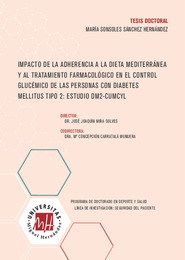Por favor, use este identificador para citar o enlazar este ítem:
https://hdl.handle.net/11000/27506Registro completo de metadatos
| Campo DC | Valor | Lengua/Idioma |
|---|---|---|
| dc.contributor.advisor | Mira Solves, José Joaquín | - |
| dc.contributor.advisor | Carratalá Munuera, María Concepción | - |
| dc.contributor.author | Sánchez Hernández, Maria Sonsoles | - |
| dc.contributor.other | Departamentos de la UMH::Psicología de la Salud | es_ES |
| dc.date.accessioned | 2022-07-14T11:56:49Z | - |
| dc.date.available | 2022-07-14T11:56:49Z | - |
| dc.date.created | 2021-06-28 | - |
| dc.identifier.uri | https://hdl.handle.net/11000/27506 | - |
| dc.description.abstract | Objetivo: Este estudio tuvo como objetivo analizar los determinantes de la adherencia terapéutica y del control glucémico en personas con diabetes mellitus tipo 2. Materiales y Métodos: Estudio transversal multicéntrico, realizado en pacientes con diabetes mellitus tipo 2 diagnosticada, reclutados por los equipos de atención primaria en Castilla y León (España). Se recogieron, en un cuestionario autoadministrado, las características sociodemográficas y clínicas de los pacientes, incluyendo la escala de adherencia al tratamiento de Morisky-Green (MMAS-4), y el cuestionario de 14 puntos de adherencia a la dieta Mediterranea. Se realizó un análisis bivariable y multivariable para analizar la falta de adherencia a la medicación y el control glucémico deficiente. Resultados: De los 3.536 pacientes, el 33,8% resultó no adherente al tratamiento farmacológico, y el 33,7% tuvo un control glucémico deficiente (HbA1c ≥58 mmol/mol [7,5%]); el 50,6% indicó tener una adherencia moderada-alta a la dieta mediterránea (≥9 puntos). El modelo de regresión logística multivariable mostró que el nivel educativo (OR 0,73; IC 95% 0,61-0,87; p<0,001) y el sedentarismo (OR 1,64; IC 95% 1,36-1,98; p<0,001) estaban asociados a una falta de adherencia. Menor edad, residencia rural, hábito tabáquico, tiempo desde el diagnóstico (OR 1,04; IC 95%; 1,03-1,05; p<0.001) y la polifarmacia se asociaron con un control glucémico deficiente. Conclusiones: El menor nivel educativo y el sedentarismo se asociaron a una falta de adherencia. Menor edad, residencia rural, el hábito tabáquico, el tiempo desde el diagnóstico y la polifarmacia incrementan el riesgo de un control glucémico deficiente. | es_ES |
| dc.description.abstract | Aims: This study aimed to analyze the determinants of therapeutic adherence and glycemic control in people with type 2 diabetes mellitus. Methods: Multicentre, cross-sectional study in patients with type 2 diabetes mellitus recruited by primary care professionals in Castilla y León (Spain). Sociodemographic and clinical characteristics were reflected in self-reported questionnaire, which included the Morisky-Green Medication Adherence Scale and the 14-point Mediterranean Diet Adherence Screener. Medication non-adherence and poor glycaemic control were analysed by bivariable and multivariable analyses. Results: Of 3536 included patients, the 33.8% reported non-adherence to pharmacological treatment, and the 33.7% had poor glycaemic control (HbA1c ≥ 58 mmol/mol [7.5%]); 50.6% of patients reported moderate-high adherence to the Mediterranean diet (≥9 points). The multivariable logistic regression model showed that educational level (OR 0.73; 95% CI 0.61-0.87; p<0.001) and sedentarism (OR 1.64; 95% CI 1.36-1.98; p<0.001) were associate with low adherence. Younger age, rural residence, smoking, time since diagnosis (OR 1.04; 95% CI 1.03-1.05; p<0.001) and polypharmacy were associated with poor glycaemic control. Conclusion: Lower educational level and sedentarism were associated with low adherence. Younger age, rural residence, smoking, time since diagnosis and polypharmacy, increased risk of poor glycaemic control. | es_ES |
| dc.format | application/pdf | es_ES |
| dc.format.extent | 179 | es_ES |
| dc.language.iso | spa | es_ES |
| dc.publisher | Universidad Miguel Hernández de Elche | es_ES |
| dc.rights | info:eu-repo/semantics/openAccess | es_ES |
| dc.rights | Attribution-NonCommercial-NoDerivatives 4.0 Internacional | * |
| dc.rights.uri | http://creativecommons.org/licenses/by-nc-nd/4.0/ | * |
| dc.subject | Diabetes mellitus | es_ES |
| dc.subject | Nutrición | es_ES |
| dc.subject | Dieta | es_ES |
| dc.subject | Estilo de vida | es_ES |
| dc.subject | Atención Primaria | es_ES |
| dc.subject | Adherencia al tratamiento | es_ES |
| dc.subject.other | CDU::1 - Filosofía y psicología::159.9 - Psicología | es_ES |
| dc.title | Impacto de la Adherencia a la dieta Mediterránea y al tratamiento farmacológico en el control glucémico de las personas con diabetes mellitus tipo 2: Estudio DM2-CUMCYL | es_ES |
| dc.type | info:eu-repo/semantics/doctoralThesis | es_ES |

Ver/Abrir:
Sanchez Hernández, Sonsoles.pdf
2,85 MB
Adobe PDF
Compartir:
 La licencia se describe como: Atribución-NonComercial-NoDerivada 4.0 Internacional.
La licencia se describe como: Atribución-NonComercial-NoDerivada 4.0 Internacional.
.png)